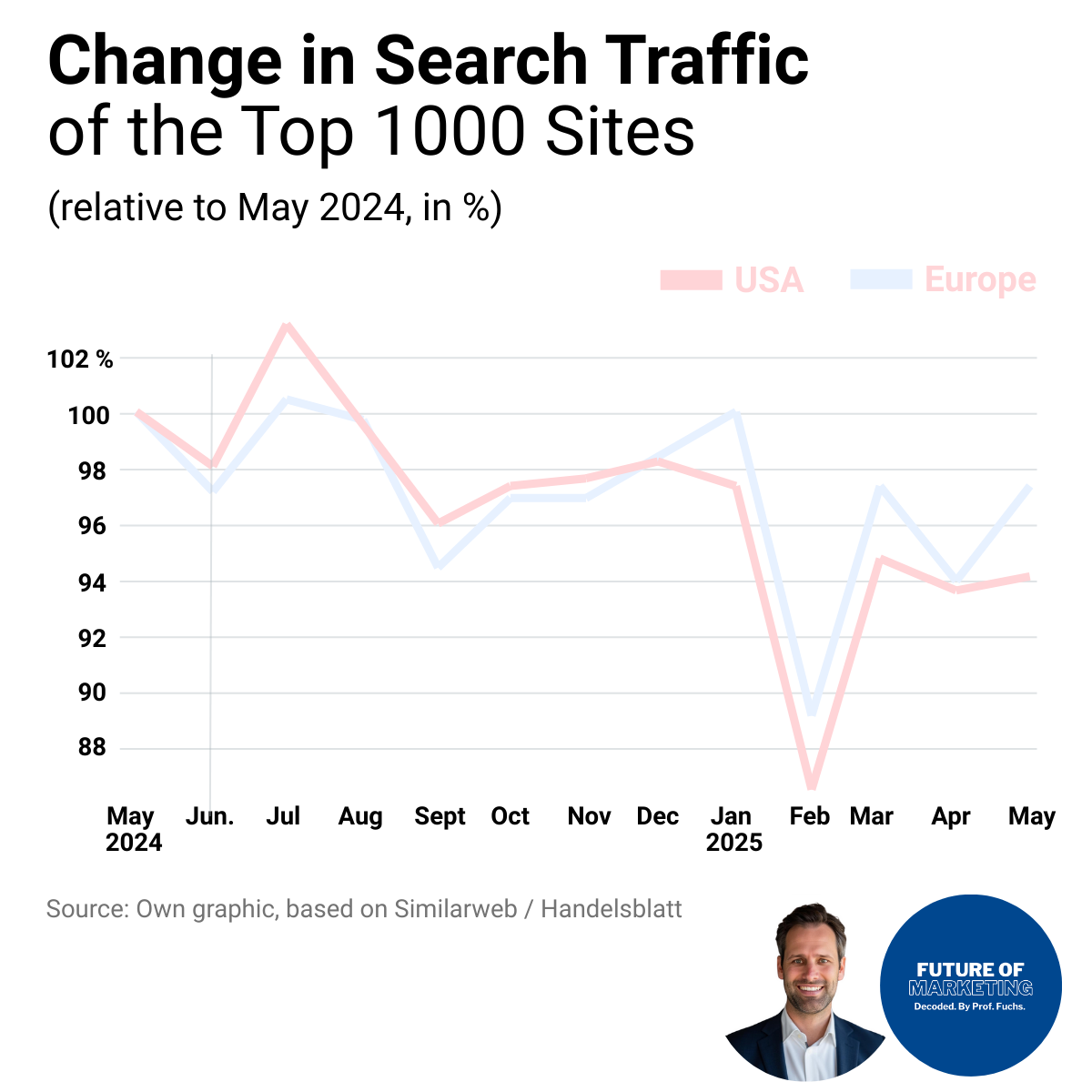How the New Google Search Transforms Marketing
From search box to Search Generative Experience ... and what it means for brands.
Prologue: The Castle on Sand of Search
For two decades, Google’s search box has been the storefront of the digital world. Billions of users type in queries every day, and trillions of dollars in business models orbit around the answers. SEO agencies thrived, publishers optimized headlines, and marketers lived and died by PageRank.
But this storefront is being rebuilt. With the rollout of Google’s Search Generative Experience (SGE), answers are no longer a list of links to click but AI-generated summaries, often so complete that the user never leaves Google’s page. And as Google itself emphasizes, this is only the first step.
Search is becoming agentic: not just providing answers, but actively carrying out tasks — from planning trips to comparing products to generating personalized recommendations .
Image source: Google
At first glance, this might look like convenience. In truth, it is a seismic shift that threatens to undermine entire ecosystems: media companies, e-commerce platforms, and brands that depend on visibility in the traditional search funnel. Without adaptation, their strategies risk becoming castles built on sand.
1. The End of Classic Search Logic
Yesterday, visibility meant PageRank, backlinks, and keyword optimization. It meant bidding for ads and optimizing click-through rates. The logic was clear: get seen, get clicked, get traffic.
Today, that logic collapses. Publishers could lose millions of clicks, because users no longer need to visit websites when answers appear directly in Google’s AI summaries. For media companies whose business model is built on traffic and ads, this is an existential threat.
And it’s not only publishers. E-commerce platforms and brands that rely on discovery through search will also see fewer customer touchpoints. Google itself provides no figures on how many searches now bypass links, but the direction is clear: fewer clicks, less visibility, more dependency on machine-curated answers. Several of the top 1,000 websites in the US have lost around half of their users compared to a year ago, while in Europe the decline has so far been less severe.
2. From SEO to AEO (Agent Engine Optimization)
This shift kills the foundations of SEO as we know it. If customers no longer browse a list of links but are presented with a single, AI-curated answer, then the marketer’s job changes radically.
You are no longer optimizing for human readers scanning search results. You are optimizing for AI agents deciding on behalf of those readers.
That is the birth of a new discipline: AEO – Agent Engine Optimization.
Industries like travel and retail as especially vulnerable. Imagine: instead of comparing dozens of hotel sites, a traveler asks Google’s AI, “Find me the best hotel in Barcelona under €200.” The system doesn’t return 20 options. It returns one or two.
The decisive question is no longer: How do I get to the top of the page? It is: What signals does my brand need to send so that an AI agent selects me?
Video source: Google
3. The Power Shift: From Attention to Algorithmic Relevance
Traditional marketing was a battle for attention. The funnel began with awareness. Brands invested billions to capture eyeballs, generate clicks, and pull consumers into journeys.
But in an agent-driven world, attention is not the bottleneck. Relevance is.
Consider shoes. In the old world, Nike and Adidas fought for search rankings: “best running shoes.” In the new world, an AI system might return just two or three results. If you are not in that selection, you do not exist in the customer’s consideration.
The goal is no longer to be seen by many, but to be chosen by the algorithm.
As I have argued before: “The next battle in marketing is not for attention – it is for algorithmic relevance.”
4. Billions at Stake for Google
This is not theory. Alphabet’s latest earnings show how much is at stake. In the first quarter, revenues rose nearly 10 percent year-on-year — a reminder that search remains the engine of Google’s $1.8 trillion empire.
Yet paradoxically, the very AI technology that promises to secure Google’s dominance could also erode its ad business. If fewer people click ads because answers are already displayed, ad revenues could shrink.
Publishers are already adapting. E.g. the German publisher Handelsblatt has launched Smart Search, an AI-powered tool for premium subscribers. Instead of forcing readers through archives, it delivers precise, personalized answers. The message is clear: even traditional media is reconfiguring itself for a world in which AI, not search, is the primary interface.
5. From Answers to Actions: The Agentic Turn
What makes this transformation even more radical is the agentic turn.
As Google’s own blog highlights, the new search will not only provide summaries but execute tasks:
It can build an entire travel itinerary across multiple sites.
It can compare products across vendors, factoring in user preferences.
It can generate a personalized meal plan based on health data.
This changes the nature of marketing: brands are no longer competing for a click, but for integration into the workflows of AI agents.
Search moves from being an information portal to becoming an operating system of life — orchestrating choices, transactions, and experiences.
6. Opportunities for Brands
The companies that adapt fastest will gain a decisive competitive advantage. Despite the risks, opportunities abound for brands willing to embrace the new reality.
Trust and quality will rise in value. Only reliable, verifiable sources will make it into AI-curated answers and workflows.
Consistency of signals is critical. Fragmented messages risk exclusion. AI rewards clarity and coherence.
Authenticity becomes a differentiator. SEO tricks will not matter. What matters is whether your brand is truly relevant, credible, and distinct.
In travel, the hotel that provides structured, transparent data and strong customer trust signals may surface automatically in itineraries created by AI. Others will vanish unseen.
7. Risks and Shadows
But let us not underestimate the dangers:
Gatekeeper dependency. A handful of platforms (Google, OpenAI, Amazon) will control access to customers.
Commoditization. AI may cluster providers into generic categories — “cheapest flights,” “top sneakers” — eroding brand differentiation.
Loss of direct contact. Customers no longer visit brand websites. They trust the agent. The relationship is mediated.
This is a profound reconfiguration of marketing power.
8. The New Role of Marketing
Marketing is moving from traffic management to trust architecture.
The old question: How do I get more clicks?
The new question: How do I ensure the agent recommends me?
Answering this requires new roles:
AEO Specialists – mastering the logic of AI-curated, agentic search.
Data Stewards – ensuring the signals you send are high-quality and consistent.
This is not just about tactics. It is about identity. The marketer of tomorrow is not a traffic manager but a steward of trust in a machine-mediated world.
👉 Answering this challenge requires nothing less than a paradigm change for marketing departments.
That could mean: Search is Dead, Selection Rules
The new Google Search is only the first domino. In five years, customers may not search at all. They will ask their AI agents — and those agents will not only answer, they will act.
The decisive marketing question will no longer be “How do I rank?” but “How do I get integrated into the agent’s workflow?”
SEO as we know it is eroding. What replaces it is Agent Engine Optimization and the race to become relevant in agentic systems.
👉 Do you think SEO is already dead — or will it reinvent itself in an agent-driven world?




Brilliant article Andreas. I had just caught up with GEOs, and now I have Agent Engine Optimization to think about too! If you could give one killer tip for cutting across both GEO & AEO what would it be?
Thank you so much for this. Marketing and discoverability is definitely getting more and more complicated. Not only do we have to define and refine what we offer (which is a process in itself), but also learn how to speak it in a different (non-hum) language. Do you see a world where people go back to local, community-based marketing and provision? Or have we as a society fully adopted global systems?